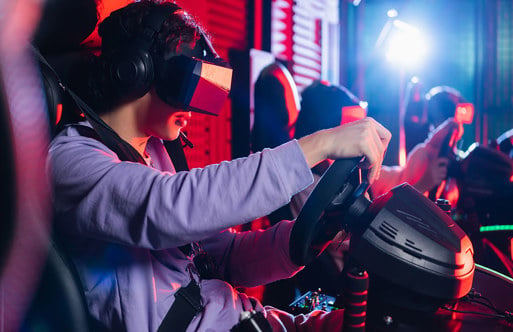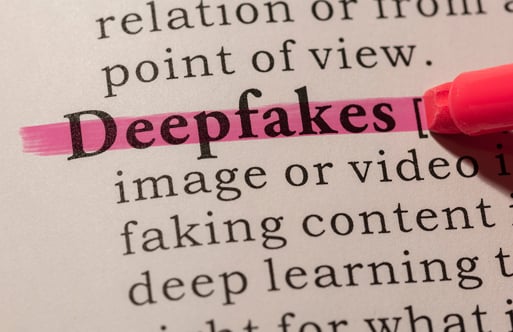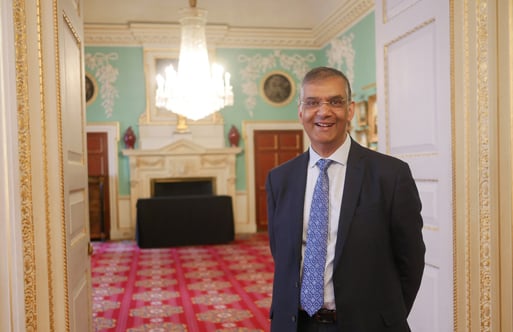What has motivated you to spend four years writing this book? That’s quite a commitment!
‘It’s involved lots of work and perhaps my willingness to make such a commitment demonstrates that I’m truly worried about the ramifications of our current direction of travel. From an environmental perspective, the drive to create ever more digital products, to use them for a short period and consign them to e-waste is having a terrible impact.
'But that’s only one aspect of my concerns - the societal problems created as developers make every possible effort to persuade us to spend more and more time online is impacting many aspects of human behaviour. It’s when I pause and think about the world that we are creating for our children - and theirs, that I become really troubled.’
Have you always been worried about the ramifications of digital technologies - tell us a little about yourself.
‘In recent times, some people that I’ve known for many years have humorously suggested that I’m in danger of becoming something of a Luddite. It’s ironic because for many years - indeed decades - I’ve been an ardent technophile. And I’ve lived through some great times!
‘I remember being a ten or twelve-year-old in the late 1960s. Technology was going to change the world - for the better! Apollo voyages to the moon, supersonic aircraft, stylish and ever larger mainframes. Science fact mixed with thrilling science fiction - time travel with Dr Who along with Gerry Anderson’s magical Fireball XL5, Stingra y and Thunderbirds.
‘Electronics was my passion. Valve technologies were going out, transistor technologies were proliferating (mainly pnp devices) and integrated circuits were poised to put an end to the bewildering slide rule. What a wonderful time: diverse technologies offering unlimited horizons!
‘After gaining a PhD in physics (and being inspired by many wonderfully eccentric academics). I moved to astronomy - developing data acquisition and control technologies and then in the mid-1980s I headed off to an EU research institute in Italy where I got to play with a rich variety of workstations, operating systems, programming languages, and communication protocols. Since then I’ve been in academia - working in various countries and (hopefully) inspiring students.
‘As for the suggestion that I’m transitioning from being a technophile to a Luddite - this motivated me to research the activities of the original Luddites and write about them in my book. In reality, they weren’t opposed to technologies of their time - but rather ways in which they were being used. So perhaps I am indeed a committed Luddite!’
What sparked your interest in ethics? Was there a moment, a kind of catalyst?
‘I slowly became aware of change. Students continuously interacting with - and seemingly addicted to - their phones. Students without the basic practical skills associated with many forms of traditional hobby. Students who, when asked to make notes, simply photograph white boards.
‘Trips back to England after years overseas - always more and more surveillance cameras – but nobody seemed to mind.
‘Ever more affordable and stylish technological products - and a sense that many people really didn’t care about how they work. And, the realisation of an ever more rapid pace of change, which is leaving in its wake extensive societal problems - these often being countered by facile governmental claims that they can be cured by technomagic.’
‘Sometimes it seems that blind faith in technology is becoming a new religion.
‘As I began to look up from the proverbial laboratory bench, by good fortune I had the chance to visit the long locked up Hollerith bunker at the Dachau complex in Germany. I was able to explore this long-forgotten and dank place - hours in that bleak time capsule left a strong impression on me. Even those rudimentary digital technologies of the 1930s were used to such devastating effect - they caused great harm and, in the case of the Holocaust, divorced administrators from the ramifications of their actions. How much greater are the dangers of today’s digital systems?
‘As for the Third Reich itself, if put it into modern terminology, it was a period of fake news, of nationalism and populism. It was a period of predictive modelling and extensive surveillance. It was a period where people couldn't discuss or question some things - there was no debate. The German people entered a state of freefall. Are we also at risk of entering technological and societal free fall - or are we already there? This is the subject of a new book that I’m writing.’
What are the hallmarks of a good digital society?
‘It promotes our humanity - if it does the converse, we have a problem.
‘The internet, for example, is a tool for empowerment. We can empower people all over the world, but we human beings are perverse; we use every technology in positive and negative ways and the internet is also a vehicle for exploitation.
‘Where’s the internet taking us? Consider it within the context of IoT, AI, robotics, predictive modelling and total surveillance.’
‘Privacy is not a luxury, it’s crucial for human development. I believe that we’re playing with fire.’
Where do you think the tech industry went wrong?
‘Think back to the early days at Silicon Valley. The people I encountered were enthusiasts: they were going to help to change the world for the better. It wasn't all about money and profit, it was about doing things differently, about doing things right.
‘Now, if we look at the wealth of some people in the computer industry, it's quite distasteful. Ethical precepts are cast to one side and the tempo at which developments are taking place leaves no time for reflection - for caution. Nobody has time to say, "hang on, what's happening here? Should we be doing this?" By the time we're asking these questions, it's already been done.
‘Does it matter? Well, I think it does. In the early days, a can-do attitude was fine. But now the stakes are enormous. Can we afford to forge ahead so that a relatively small number of people can satisfy an unquenchable thirst for profit?’
How do you turn students onto the idea of ethics?
‘When first asked to deliver an ethics course, I was put out. I wanted to carry on teaching hardcore subjects. But since I got involved, I’ve never looked back.
‘Students are encouraged to examine the big picture. It's as if they open their eyes for the first time and see what's happening around them.
‘I get them to question what they’ve never questioned. Their ideas begin to change; the brakes suddenly go on. They skid because their preconceived ideas are challenged. They begin to see the motivations of some of the big players: the manipulation; the drive to foster an addiction to cyberspace; their thirst for our data.
‘Sometimes when students find out they've got to take an ethics course, they come to me before it starts and say “we want to study Java, create Apps and learn valuable skills. What’s the point of an ethics course?”
Their attitudes quickly change. And when teaching face to face, they quickly realise that this is a course with many differences. For example, invariably in the first lecture (dealing with e-waste) they watch as their lecturer in his tweed jacket takes a large hammer to a computer monitor. They look up from their devices - the physical world becomes much more interesting than cyberspace!’
‘I don't think any student should graduate in a computing-related discipline without taking a really strong ethics course.’
How do we invest mid-career professionals with this idea of ethics?
‘The education system must change to accommodate lifelong learning. We need to give students a passion for learning and a profound sense of curiosity. As a student, I paid no fees for tertiary education, but now students must spend years paying off debt.
‘And what’s the shelf life of a technology-related degree? To what extent is content dated before it’s delivered? We need to educate for the future, not the past. We need to make education readily affordable so that it can be infused into our lives and ethical considerations must form a central tenet.
‘As people gain more senior positions, they mustn’t be allowed to forget the need for ethical stewardship.’
How do you think future historians - tech archaeologists - will look back on us today?
‘I believe that our direction of travel will change. The alternative appears bleak: increasing polarisation of wealth; loss of employment; loss of privacy; increasing governmental control; growing mental health problems.
‘We risk becoming subservient to ubiquitous technologies and, as we empower technological systems, autonomous weapons systems will emerge. If we continue on our current course, these are inevitable and pose immense dangers.
‘Historians will be able to determine whether we proactively and prudently sought change, or changed only when absolutely forced to do so. I hope that if they include ITNOW as a research resource, they will find that BCS was at the forefront of charting a prudent course.’
Ethics in Computing, Science, and Engineering - A Student’s Guide to Doing Things Right by Barry Blundell is available from Springer.

















